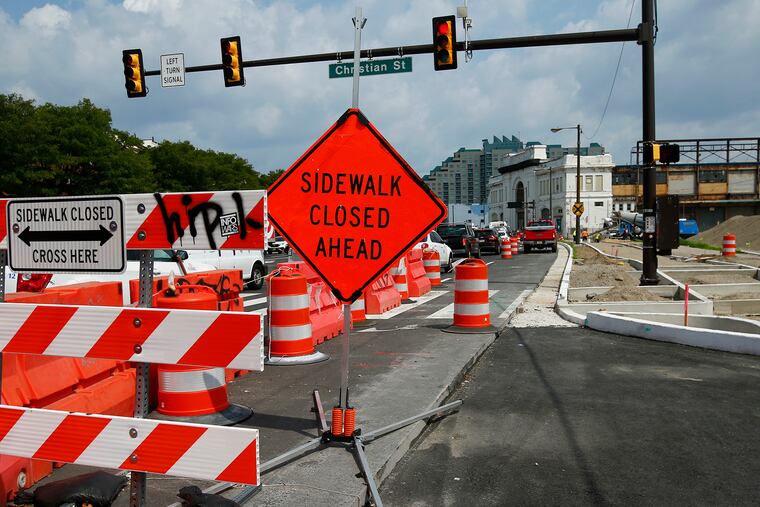Philadelphia should fund sidewalks like it funds streets | Opinion
Too many of our city’s sidewalks are crumbling and dangerous, particularly in low-income communities.

Walking is a fundamental right. All Philadelphians deserve access to safe sidewalks. Yet too many of our city’s sidewalks are crumbling and dangerous, particularly in low-income communities. Fixing Philly’s crumbling sidewalks is an equity issue, and city leaders must allocate resources to make our sidewalks safe for walking again.
The city’s Vision Zero goal commits the city to zero traffic deaths by 2030. As the foundation of safe pedestrian travel, sidewalks are an integral part of achieving that goal. They provide economic, mental, physical, and social benefits, and must be in good repair to facilitate safe travel between communities and to access public transit.
» READ MORE: Facing a ‘horrific’ year for traffic deaths, there’s plenty of work ahead as city releases Vision Zero 2025
Yet, Philly’s sidewalks are so bad that Philadelphians with disabilities and three advocacy groups filed a suit in 2019 saying they violate federal law regarding people with disabilities.
A sidewalk inventory conducted in 2012 found more than 230 miles of Philadelphia sidewalks were in “poor” or “very poor” condition. The result is lawsuits to the tune of more than $33 million between 2012 and 2017. More than 30% of Philadelphia residents don’t own a car and must rely on sidewalks. Seniors, children, and people with disabilities — including those using wheelchairs and other mobility devices at risk for tripping and falling — are forced to share road space with speeding cars. Low-income communities are especially at risk for traffic violence and most in need of safe sidewalks to access education, transit, and jobs.
And pedestrians account for only 7% of people involved in crashes but 40% of people killed in crashes, per the city’s Vision Zero 2025 Action Plan. Fatal or serious injuries are three times more likely to occur in low-income communities and 30% more likely to occur in communities of color.
The Delaware Valley Regional Planning Commission (DVRPC) has taken critical steps toward identifying dangerous sidewalk gaps with its Pedestrian Portal to track and update the region’s sidewalks and help prioritize pedestrian projects. However, funding and a well-thought-out plan to improve conditions in sidewalk infrastructure remains to be seen.
Philadelphia’s current sidewalk maintenance and repair mechanism is broken, underfunded, and burdensome for homeowners. Philadelphia does not generally fund or repave residential sidewalks, other than curb ramps, unless deemed necessary during street repaving. According to the city, property owners are responsible for the maintenance and repair of sidewalks along their homes and businesses. Substandard sidewalks can be reported to 311 or the Streets Department, who notify property owners via a Curb and Footway Notice and give owners 30 days to make repairs. Unfortunately, lax enforcement means property owners can ignore the notice without consequences, leaving unsafe sidewalk conditions indefinitely. In a city where 28% of homeowners are cost-burdened, this strategy creates noncompliance and is an equity issue.
» READ MORE: Keep MLK Drive closed to cars forever | Opinion
Philadelphia could learn from Baltimore’s sidewalk program and create both a payment plan and tax credit based on income to help homeowners pay for sidewalks. This would require budgeting dedicated funds for sidewalks much like the city does for streets. Otherwise, sidewalk deterioration will persist and create unsafe pedestrian conditions, inevitably exposing the city to further trip and fall claims.
Establishing the condition of Philadelphia’s sidewalks through DVRPC’s Pedestrian Portal can lay the groundwork for a sidewalk master plan, and allow the city to prioritize and plan pedestrian projects. Such a sidewalk blueprint would be a critical first step in creating the advocacy necessary to secure political will and earmark funding. To do this, the city must have a sidewalk coordinator responsible for a master strategy that establishes real repair standards reinforced by inspection and compliance guidelines. City funding for sidewalks is an important step to unlocking state and federal funding, an essential component for the long-term success of a sidewalk program. Finally, the city must execute an education campaign for city staff, contractors, and property owners to spread awareness about this issue.
When residents and communities rely on sidewalks to travel safely, the cost of ignoring their infrastructure is too high.
Joseph O. Minott is the executive director and chief counsel of the Clean Air Council, which sponsors the pedestrian advocacy organization Feet First Philly. Fran Fulton is a retired Liberty Resources disability rights advocate and a Feet First Philly steering committee member.